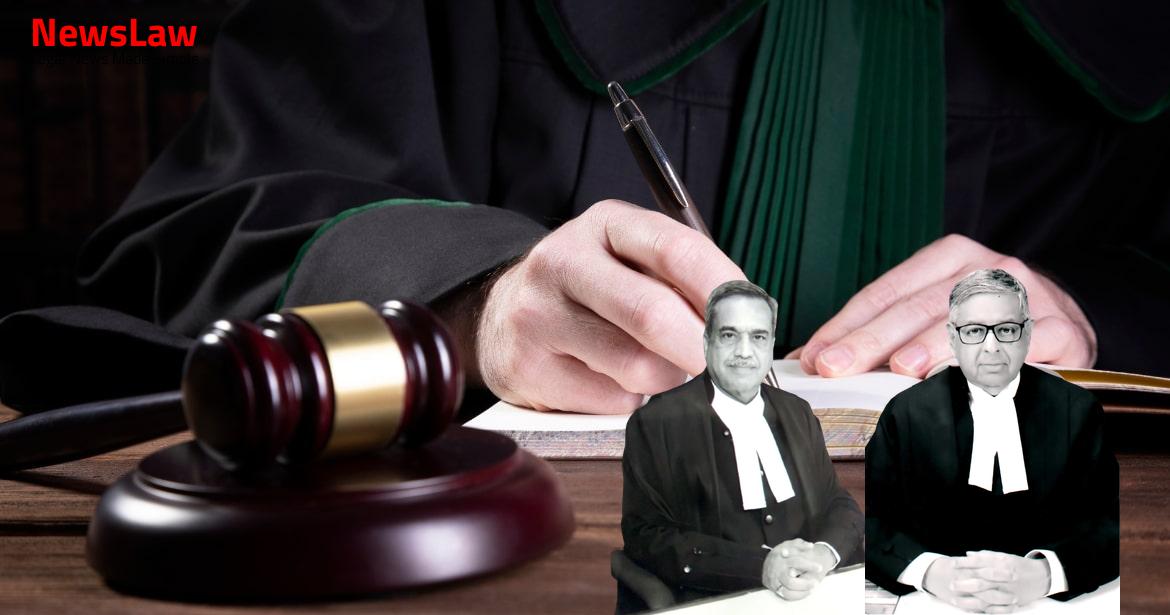The recent legal case delves into the core principle of impartiality in arbitration proceedings, highlighting the importance of independence and neutrality of arbitrators. The court’s in-depth legal analysis emphasizes the need for unbiased adjudicators to uphold the integrity of the arbitration process. Stay tuned to delve into the complexities of ensuring fairness and neutrality in legal disputes.
Facts
- The respondent firm approached the Sole Arbitrator as per Clause 13 of the Agreement dated 31.03.2015 for settlement of a commercial dispute.
- During the arbitration proceedings before the Chairman-Sole Arbitrator, the respondent firm approached the High Court for appointment of an arbitrator under Section 11 of the Act.
- The petitioners submitted that once the respondent firm invoked Clause 13 of the Agreement by approaching the Chairman-Sole Arbitrator, it cannot later seek appointment of another arbitrator through the High Court.
- The High Court, however, considered Sub-section (5) of Section 12 read with Seventh Schedule to the Act and appointed a former District and Sessions Judge as an arbitrator.
Also Read: Judicial Review of Delayed Writ Petition
Arguments
- Petitioner is aggrieved by the order appointing a fresh arbitrator by the High Court under Section 11 of the Arbitration Act.
- Petitioner argues that the High Court should not interfere with the arbitral proceedings unless there is a right of appeal under Section 37 of the Act.
- The dispute between the parties should have been resolved by the Registrar as per the Rajasthan Cooperative Societies Act, 2001, and the decision of the Registrar should be final.
- Section 58 of the Rajasthan Cooperative Societies Act, 2001 supersedes Sub-section (5) of Section 12 of the Amendment Act, 2015, preventing any court from entertaining suits or proceedings related to such disputes.
- As per Clause 30 of the Bye Laws of Sahkari Sangh, all disputes of the society should be resolved as per the Rajasthan Cooperative Societies Act, 2001.
- The High Court erred in appointing an arbitrator other than the one specified in the agreement dated 31.03.2015.
- The provisions of Sub-section (5) of Section 12 and the Seventh Schedule of the Act do not apply to the current case as the agreement was made before their insertion.
- The ‘Chairman’ being an elected member does not fall under the disqualified/ineligible persons listed in the Seventh Schedule of the Act, according to the petitioner.
- The High Court’s reliance on the Seventh Schedule of the 2015 Act to disqualify the Chairman as an arbitrator is erroneous, as the Chairman, being an elected member, does not have similar influence as mentioned in the clause.
- The impugned order passed by the High Court appointing an arbitrator is considered unsustainable.
- The distributorship agreement between the parties was dated 31.03.2015, before the relevant amendments to the Act came into effect.
- Learned Counsel for the petitioners presented arguments extensively on behalf of the petitioners.
Also Read: Ownership Dispute: Legal Analysis on Admission and Decree
Analysis
- Section 12(5) with Seventh Schedule emphasizes on the impartiality and independence of arbitrators.
- The concept of ‘neutrality of arbitrators’ refers to their independence and impartiality without bias towards any party.
- The disqualification under Section 12(5) renders an arbitrator ineligible and de jure unable to perform his functions.
- Parties must have an express agreement in writing to waive the ineligibility of an arbitrator as per Section 12(5).
- The appointment of an ineligible arbitrator goes against the principles of impartiality and independence of arbitration.
- The obligation to appoint an impartial and independent adjudicator is crucial, especially when a state entity is involved.
- The focus is on ensuring independence and impartiality, even if prior agreements exist, to maintain the integrity of the arbitration process.
- Independence and impartiality are key aspects of arbitration proceedings.
- Rule against bias is a fundamental principle of natural justice in judicial and quasi-judicial proceedings.
- An ‘express agreement’ in writing is required to satisfy the provisions of Section 12(5) in arbitration.
- The necessity of an independent mind for arbitrators was highlighted by the Cour de Cassation in France.
- The Chairman of the petitioner Sangh may be considered ‘ineligible’ to continue as an arbitrator.
- Certain criteria in the Seventh Schedule disqualify arbitrators, including having past or present business relationships with parties or being directly involved in the matters in dispute.
- The UK Supreme Court emphasized the impartial resolution of disputes as the primary goal of arbitration, despite the contractual nature of the relationship between parties and arbitrators.
- Ineligibility of a person to be appointed as an arbitrator under Section 12(5)
- Proviso allows parties to waive ineligibility by express agreement in writing after disputes arise
- Seventh Schedule sets out categories making a person ineligible as an arbitrator
- Prior agreements to the contrary are nullified by Section 12(5)’s non-obstante clause
- Any person falling within Seventh Schedule categories is deemed ‘ineligible’ as an arbitrator
- The High Court did not commit any error in appointing an arbitrator other than the sole arbitrator – Chairman as per Clause 13 of the Agreement.
- The appointment was made in exercise of powers under Section 11 read with Section 14 of the Act.
- All applications are deemed to be dismissed as per the reasons stated above.
- The special leave petitions have been accordingly dismissed.
Also Read: Interpretation of Statutory Limitation under Section 263(2)
Case Title: JAIPUR ZILA DUGDH UTPADAK SAHKARI SANGH LIMITED Vs. M/S AJAY SALES AND SUPPLIERS (2021 INSC 465)
Case Number: SLP(C) No.-013520 / 2021



